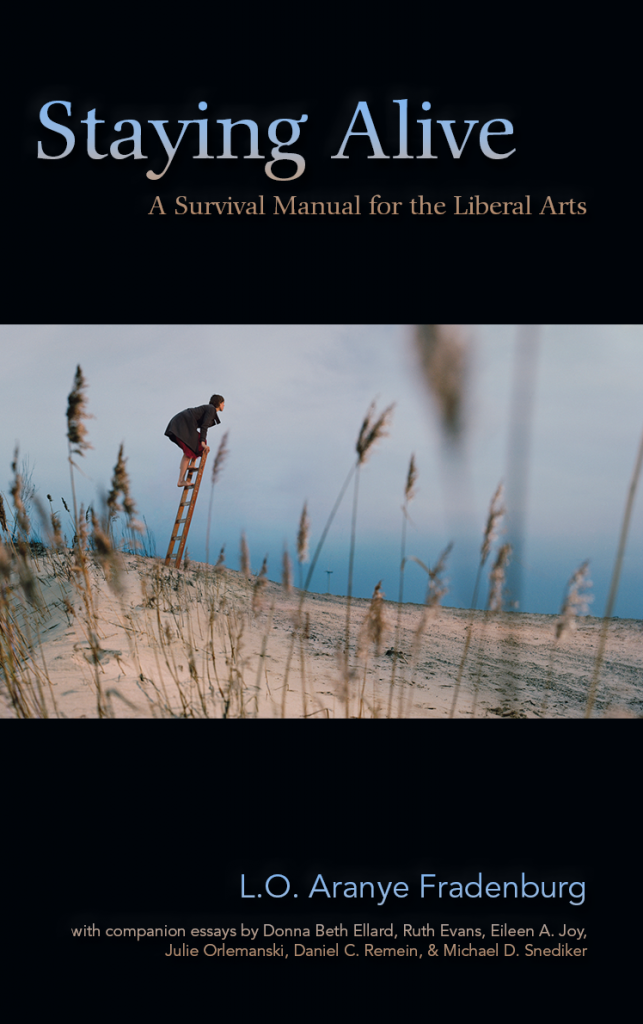Staying Alive: A Survival Manual for the Liberal Arts fiercely defends the liberal arts in and from an age of neoliberal capital and techno-corporatization run amok, arguing that the public university’s purpose is not vocational training, but rather the cultivation of what Fradenburg calls “artfulness,” including the art of making knowledge. In addition to sustained critical and creative thinking, the humanities develop the mind’s capacities for real-time improvisational communication and interpretation, without which we can neither thrive nor survive. Humanist pedagogy and research use play, experimentation and intersubjective exchange to foster forms of artfulness critical to the future of our species. From perception to reality-testing to concept-formation and logic, the arts and humanities teach us to see, hear and respond more keenly, and to imagine, or “model,” new futures and possibilities. Innovation of all kinds, technological or artistic, depends on the enhancement of the skills proper to staying alive.
There are many different kinds of intelligence, and there will always be a few writers who don’t need to read Shakespeare in college, or game designers who don’t need economics courses to get rich. But a terrible narrowing of the mind and of mental experience is ongoing in our country, sometimes waved on by the very scientists who ought most of all to respect the mind’s powers. The philosopher Guillaume LeBlanc argues that philosophy should now understand itself as work performed on behalf of particular cultures and ecologies, producing a new ethos of the philosopher for whom the question of belonging to an ordinary world has become, not something to bracket or transcend, but centrally important. Understanding how ordinariness is produced, and critiquing self-evidence, remain crucial activities of cultural analysis, as does the defense of expertise; but it is not simply a matter of intellectuals going public. It is also a matter of experts deciphering the relationship of their work to the arts of thriving and surviving, and feeding the results of their analyses back into their work. And it is time to fight, not just for this or that way of thinking, but for the experience of mind itself, and its cultivation — for (the pleasures of) knowing, reasoning, investigating, analyzing, debating, loving, desiring, and reflecting.
Bringing together psychoanalysis, neuroscience, animal behavioral research, biology & evolutionary theory, and premodern literarature (from Virgil to Chaucer to Shakespeare), Fradenburg offers a bracing polemic against the technocrats of higher education and a vibrant new vision for the humanities as both living art and new life science. Contrary to recent polemics that simply urge the humanities to become more scientistic or technology-focused, to demonstrate their utility or even trophy their uselessness, Staying Alive does something remarkably different: it argues for the humanism of a new scientific paradigm based on complexity theory and holistic and ecological approaches to knowledge-making. It urges us to take the further step of realizing not only that we can promote and enhance neuroplastic connectivity and social-emotional cognition, but also that the humanities have always already been doing so. “Nature always exceeds itself in its expressivity” — which is to say that living is itself an art, and artfulness is necessary for living: for adaptation and innovation, for forging rich and varied relationships with other minds, bodies and things, and thus, for thriving — whether in the boardroom or the art gallery, the biology lab or the recording studio, the alley or the playground, the book or the dream.
Staying Alive contains companion “fugue” essays by Donna Beth Ellard, Ruth Evans, Eileen A. Joy, Julie Orlemanski, Daniel C. Remein, and Michael D. Snediker.
Because of our failure to recognize that scientific method and humanist styles of interpretation and research enhance one another (in practical as well as theoretical ways), our ships pass in the night, bearing fantastic images of the O/other disciplines—oblivious to the fact that the improvisational, artful nature of real-time knowing is not a failed attempt at empiricism, but rather adaptation (and creativity) in action.
TABLE OF CONTENTS //
Prelude: Hands Off Our Jouissance: The Collaborative Risk of a Shared Disorganization, by Eileen A. Joy
Chapter 1: Driving Education: A Crash Course
Fugue: An Army of Lovers, by Julie Orlemanski
Chapter 2: Living the Liberal Arts: An Argument for Embodied Learning Communities
Fugue: Human-Tongued Basilisks, by Daniel C. Remein
Chapter 3: Breathing with Lacan’s Seminar X: Expression and Emergence
Fugue: The Object Breath, by Ruth Evans
Chapter 4: Life’s Reach: Territory, Display, Ekphrasis
Fugue: Ekphrastic Beowulf: Defying Death and Staying Alive in the Academy, by Donna Beth Ellard
Coda: Fuzzy Thinking, by Michael Snediker



4 thoughts on “Staying Alive”